Why the Orthodox Church Needs Deacons
15 December 2016Imagine going into a fancy restaurant for a special meal. The dining room is beautifully decorated, only the best linens are used, and the glow of candlelight creates a warm ambience. Through the kitchen doors, you see the chef hard at work preparing a delectable dish. He then shouts from the kitchen, never moving from his cutting board, to sit yourself down and asks you what you want to order. You think this is odd, but then you notice there isn’t a single waiter or waitress in the entire establishment. What is wrong with this scene is analogous to what is presently amiss within the Orthodox Church – namely the significant lack of deacons within our parishes.
A Model Of Service
“Deacon” literally means server. Deacons are the waiters (servants, slaves) at the table of the Lord (e.g., Luke 14:16-24; John 2:1-11). Therefore they are usually found during Liturgy around the altar helping the priest. Deacons are also the earthly equivalent of the angels who are intermediaries between God and man (Hebrews 1:14). So, they are often mediators uniting the laity with priests and bishops, or deacons sometimes represent the Church’s interests to the populous. Additionally, deacons are the third rank of the ecclesiastical hierarchy appointed to relieve bishops and priests from work they are too busy to fully attend to (see Acts 6:1-6). Therefore, deacons often minister to widows, orphans, shut-ins, the poor, the sick, the disabled, the imprisoned, the undereducated, and others with special needs.
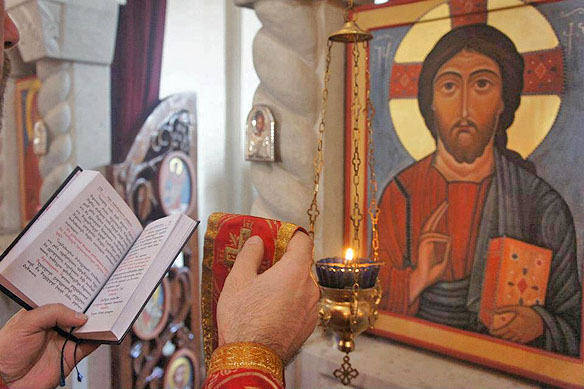
However, more important than what they do, deacons represent something of tremendous value within the Body of Christ: they are our models of service – no matter what form that service takes. Throughout the Gospels, Jesus places particular emphasis on being a servant as a defining characteristic of His followers. For example, our Lord stated, “Whoever serves me must follow me, and where I am, there will my servant be also. Whoever serves me, the Father will honor” (John 12:26). To be a servant is to emulate Christ Himself: “. . . whoever wishes to become great among you must be your servant, and whoever wishes to be first among you must be slave of all. For the Son of Man came not to be served but to serve, and to give his life a ransom for many” (Mark 10:43-45, cf Luke 22:27). In these verses, “servant” in Greek is “diakonos” [διάκονος]. Therefore, all Christians are called to be “deacons” in whatever their circumstance in life. The role of the ordained deacon is a “sermon without words,” a living icon, of this calling to all believers. If you consider we will be judged based on our service to others (Matthew 25:31-46), then it is obvious how vital it is that we are continually reminded to serve.
A Reflection of The Trinity
The office of the deaconate completes the triune ministry of the priesthood established by God. In the Old Testament, those that ministered to God on behalf of Israel were the Aaronites (Exodus 28-29; Leviticus 8-10; 16; 21-22) and the Levites (Exodus 32:25-29; Numbers 3:12-13; 18:21-24; 35:2-8). The Aaronites (a sub-clan of the Levites) where divided into those that where chosen to be high priests—or “chief priests” in the New Testament—and the regular priests. Those three offices correspond to the Church’s priesthood of episcopate (chief priest), presbyter (regular priest), and deacon (Levite). This sacerdotal division of labor—in very simplified terms: administrator, handler of the sacrifice, and servant—made for a balanced whole. However, this team functions well not only when the roles are well-defined (each with their own particular tasks as defined by Scripture and Church Canon), but also when the number of ministers represents the duties that need to be accomplished. In other words, there were few chief priests/bishops, a moderate amount of priests, and a large number of Levites/deacons. Note that it was not uncommon in the early Church to emulate the Biblical model and have seven deacons for every congregation. Yet at present there are only slightly more deacons than bishops in most Orthodox dioceses.
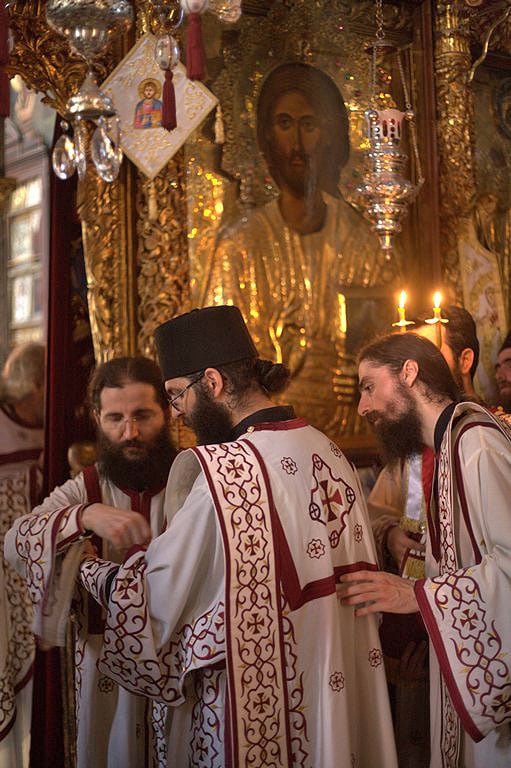
Deacons, Monastery of Vatopedi, 2011
This ministerial human trinity within ancient Israel and the Church obviously reflects the Divine Trinity. In nature, the triangle is the strongest and most stable structure there is. If deacons are missing from our parishes, then what may that forebode for the strength and stability of our Church? The triune ministry of bishop, priest, and deacon also reflects three major archetypes of Christ: Sovereign–king (John 1:49) or high priest (Hebrews 3:1), Shepherd (John 10:11), and Servant (Philippians 2:7). Therefore, if the presence of a deacon is absent from a church, then symbolically it is as if a part of the Trinity, or a part of our Savior, is also missing.
Assistants
Similar to the Trinity, there is a “three in one” function to being a deacon: a deacon expresses his role of servant primarily by being an assistant, a representative, and a care-giver. A deacon assists his Bishop in carrying out administrative tasks and/or assists the celebrant—bishop or priest—in performing the Divine Liturgy. Did you know that most of the spoken parts of St. Chrysostom’s Liturgy was written for the deacon? However, in most parishes those lines are read by the priest. There are three consequences when this happens: First, there are many liturgical prayers that the priest should be silently reciting while the deacon is chanting a litany or performing some other action (e.g., censing the church).
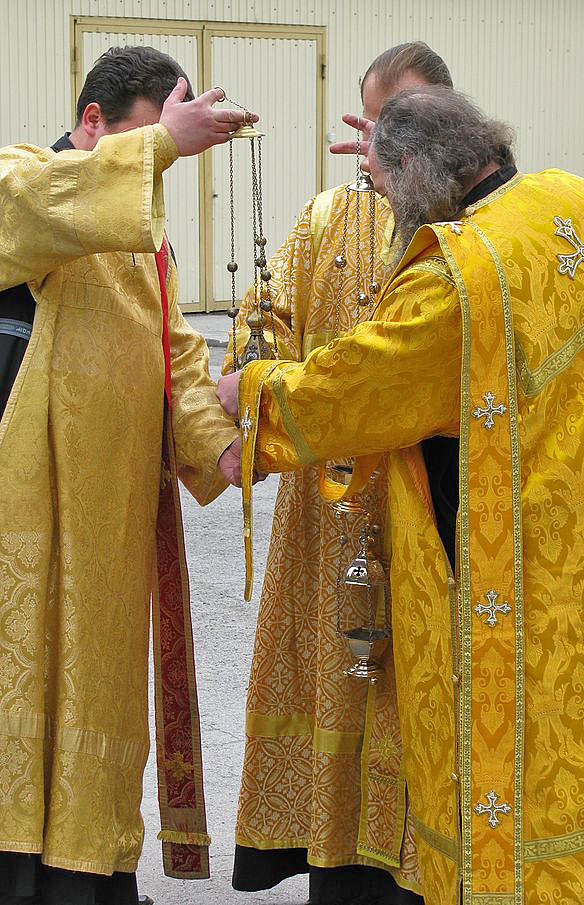
Deacons preparing incense, Novosibirsk, Russia (CC Wikipedia)
However, when there is no deacon, often the priest has to rush through or omit many of the prayers to cover the deacon’s lines or duties. Second, the deacon not only calls the laity to focus on God (“Let us attend”) within the Liturgy, but also directs the congregation by his gestures (postures and movements) in how to worship God with “reverence and awe” (Hebrews 2:28). Yet, when there is no deacon, many of these gestures go unexpressed by the priest who usually must stay by the altar to execute his regular duties. Third, the deacon is frequently dialoguing with the priest throughout the Liturgy. Most of this quietly spoken dialogue, usually the deacon asking for the priest to bless various actions, is missing from the ritual when there is only the priest performing the service. This subtracts from the Liturgy some of its spiritual and ceremonial dignity. In a nut shell, the Liturgy is a more moving drama when it is performed as it was intended — two separate actors each with their own lines and roles.
Representatives
The deacon also serves by being a representative of various parties. As a representative of the laity, he directs their prayers to God during the various worship service litanies. It was traditional for the deacon to not only chant the prescribed prayers found in the service books, but to also occasionally add prayers that represented the particular needs of those in the community. The deacon also served as the priest’s “eyes and ears” and so reported to him various concerns within the congregation. In this capacity, the deacon served as a mediator—someone that could be trusted to represent the good of the whole church and not that of any particular interest group. The priest had someone he could consult when it came to making decisions regarding the life of the parish; and the people had someone to consult when they didn’t understand something that was going on within their parish or diocese.
Deacons also represented the directives of the bishop or priest in various manners. Deacons were often emissaries that attended ecclesiastical functions, from parish council meetings to ecumenical councils, when the bishop or priest could not be there. Deacons also represented the bishop to the general public through giving presentations concerning Church policies or programs to the media or to various civic groups. Deacons didn’t speak by their own authority but rather communicated the will of their bishop or priest. As representatives, deacons only served as messengers or intermediaries.
What is the cost to the Orthodox Church when it lacks sufficient representatives? Consider that democracies could not exist without representatives. In fact, democratic institutions are often referred to as “representative-type governments.” Representatives provide a bridge that unites (Ephesians 4:3) those in authority with those under authority. Representatives keep lines of communication clear by providing regular feedback to all parties concerned. Adequate representation is what makes a governing body run efficiently and effectively. As a result, there is stability and satisfaction, a sense of security and fairness, within the state (for a converse example see 2 Samuel 15). Therefore, the Orthodox Church would greatly benefit by significantly increasing the number of deacons within its ranks.
Care-Givers
The third role of deacons—as important, if not more important, than the previous two roles—is that they are care-givers within the Church. The original intent of the Apostles was to select men who could gather and distribute various resources to those in need, so the Apostles could continue to devote themselves to “prayer and to serving the word” (Acts 6:4). Deacons served the Body of Christ by feeding, helping, visiting, teaching, and encouraging the disadvantaged from every walk of life. For centuries, deacons were the “social-workers” of the faith. They oversaw the various charitable undertakings that the Church engaged in. They were also “medics” that went to the front-lines and directly ministered to those that had fallen in life’s battles. While bishops preserved the teachings and traditions of the Church, and priests preserved the sacramental life of the Church, it was the deacons that preserved the health and well-being of those who attended the Church—as well as those outside its doors.
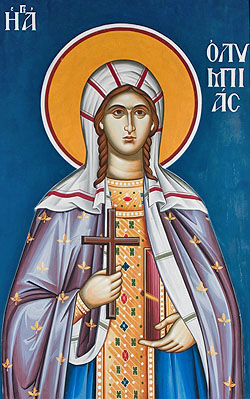
Saint Deaconess Olympia (4th Century). St. John Chrysostom had high regard for Olympia
Historically, this role of care-giver was open to both men and women. Women could be ordained as deaconesses, to serve in a charitable capacity, particular to women or children with special needs, even though deaconesses could not fully serve in the roles of “assistant” or “representative” as delineated above. Unfortunately, deaconesses are even more rare than deacons in the Orthodox Church—in fact, deaconesses may soon be in danger of becoming extinct.
Do you know of a priest that is not over-worked? Do you know of a priest who didn’t wish he could clone himself so that he could be at two or more places at the same time? Do you know of a priest that wouldn’t dearly desire to have some additional time for prayer and study? The needs of the people within any particular parish are many while those that are there to answer those needs are few. Deacons and deaconesses can greatly relieve a priest or a bishop of the many tasks that, though they have a heart for doing, they don’t always have the time to do. After the Apostles ordained deacons, there was an immediate positive benefit for the Church: “the word of God continued to spread; the number of the disciples increased greatly” (Acts 6:7).
Tradition
The deaconate has had a long and illustrious career within the Orthodox Church. The first martyr of our faith was the deacon Stephen (Acts 6:8-7:60). After him, there are nearly 100 deacon and deaconess saints mentioned in the Great Horologion. At one time there were 120 deacons and 80 deaconesses at the church of the Holy Wisdom (St. Sophia) in Constantinople. Deacons have been heads of schools, hospitals, orphanages, and other charitable institutions. St. Athanasios was a deacon who was listed in the ranks of those that attended the first ecumenical council that produced our Nicene Creed. Without going into more examples, of which there are many, it should by now be clear that the deaconate was always a part of the life-blood of the “One, Holy, Apostolic and Catholic Faith.”
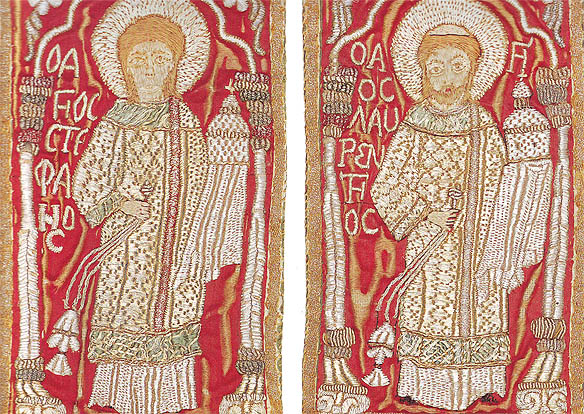
Saint Deacons Stephen and Lawrence. Epitrachelion from Iviron Monastery, Holy Mountain Athos, 17th Century
So what happened? Why are deacons so absent from the present-day Church? Why do the Baptists and other Protestant denominations maintain the tradition of having several deacons within their congregations when the Orthodox Church does not? Three possible reasons: first, due to priests being martyred during periods of persecution, and the growth of new churches as people immigrated to other lands, there was a greater need for priests than deacons to fill the parishes. Those graduating from seminary as deacons were soon elevated to priests to meet the need. Second, there were limited resources. Most parishes, particular those that were missionary churches, couldn’t afford to support a deacon in addition to a priest. And there were not enough seminary graduates to fill both positions even if the church had the funds to cover the expense. Third, due to the previous two reasons, the office of the deaconate began to be forgotten. As the priest covered the deacon’s roles within the Liturgy, and various church ministry groups or programs took over some of the care-giving duties of the deacon, the original need for there being a deacon became lost within the corporate consciousness of the Church.
All of the above reasons can be corrected, and need to be corrected, within the Orthodox Church. Lay, part-time, deacons can be ordained. There is nothing within the Scriptures or the Church Canon that says a deacon can’t have a secular job in addition to his vocation of being a deacon. This would correct the problem of there not being enough financial resources to support a deacon, or several deacons, within a parish. The loss of memory regarding a need for there being a deacon can be corrected by the dissemination of articles like this to Orthodox believers. Which leaves just one issue left unresolved. . .
Potential Priests
Lay deacons can be a pool from which potential candidates for the office of presbyter can be drawn from. Seminary does not have to be the only route to ordination of either a deacon or a priest. For centuries, the requisites for being a deacon were solely drawn from Scripture (e.g., 1 Timothy 3:8-12) and Church Canon (e.g., canon 14 of the Quinisext Council in Trullo, canon 78 & 79 of the Holy Apostles). There are many spiritually mature men who would be interested in ordination to the deaconate if they didn’t have to forsake their careers, and their financial responsibilities to their families, to go to seminary for several years. Once ordained as lay deacons, and having had a few years of practice under their belts, many of these men may then choose to heed God’s calling to become a presbyter.
Most of Christ’s disciples were not well-educated (e.g., Acts 4:13). They learned their trade by paying close attention to their Master and having “hands-on” experience. On-the-job training can be as valuable as being able to hang a diploma on your wall. For a long time in the Orthodox Church, even up to present, advancement to ordination was sometimes made from monks who did not necessarily obtain a graduate degree in divinity, but still met the minimum requirements of being “men of good standing, full of the Spirit and of wisdom” (Acts 6:3). However, perhaps a compromise can be reached. The Orthodox Church can create and encourage home or parish study programs, under the guidance of the diocese bishop and local priest, that specifically educates and trains deacon candidates. And those that previously have had significant Christian religious education and experience could be recognized for the work they have already done, so they wouldn’t have to repeat their efforts in order to be ordained a deacon.
Pray
Seven arguments were given as to why the Orthodox Church needs deacons. If you were convinced by what was presented, then share this article with others. Ask your parish priest about what can be done to re-establish the presence of deacons within our beloved Church. Particularly talk to your priest, and perhaps write your bishop, if our Lord is impressing upon your heart the desire to be a deacon or a deaconess. And if your church is blessed to have a deacon or two, then make sure you voice your appreciation to them for the good work they do. Finally, and above all, pray: “He [Jesus] said to them, ‘The harvest is plentiful, but the laborers are few; therefore ask the Lord of the harvest to send out laborers into his harvest’” (Luke 10:2).
“It would behoove you, as a church of God, to elect a deacon to act as the ambassador of God” (St. Ignatius, Bishop of Antioch – c.35-107 AD)
Source: Again magazine, Vol. 28, No.3, Fall 2006. This article was posted here with the direct permission of Michael Bressem, Ph.D.






